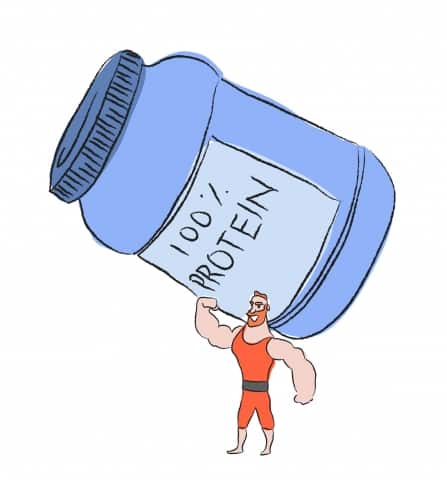Nutrition combined with exercise is vital to achieving performance- and body-composition-related goals. Studies have shown that simply working out is not a significant way to lose body fat, but that dieting or a combination of diet and exercise can be the best method.
A 2013 study shows that simply eating less calories may not be an effective way to lose body fat as it can also result in a significant decrease in muscle mass. However, a caloric-deficit diet that includes a high percentage of lean protein allows the body to retain more muscle mass while still losing body fat.
Further, high-protein diets leave you feeling more full on less calories. Protein requires more energy for the body to break down than fats and carbohydrates, which causes some of the calories to burn off during digestion and also can cause individuals to eat less overall.

So, how does one know how much protein to consume per day? Health Canada says that the minimum protein requirement for most adults is 0.8 grams per kilogram of body weight — or 0.36 grams per pound. For a 70-kilogram — about 154-lb — person that’s 56 grams a day. However, this has been found to be insufficient for athletes and those looking to lose body fat while maintaining muscle mass. The number may also be not enough for elderly populations who are at risk of losing muscle tissue rapidly.
While the long-term health benefits of high-protein diets are unknown, some studies debate the effects of animal protein on bone health and caution its intake for those with kidney problems. The benefits of muscle growth and fat loss cap off at intakes above 2-3 grams per kilogram of body weight a day.
A good range for active individuals, and those wanting to lose body fat and preserve muscle, is to consume between 1-1.5 grams of protein per kilogram of their body weight, or 0.45-0.68 grams per pound. Some individuals who are very active may do well consuming up to 2.2 grams per kilogram or 1 gram per pound.
Now that you have an idea of how much protein is optimal, how can you go about getting that much into your diet? If you eat healthily and choose high-protein foods at each meal and snack, hitting protein targets is quite easy, as the average daily intake for U.S. Americans is 1.2 grams of protein per kilogram of body weight for most people. However, not all of us are eating well-balanced meals all the time.
This is where protein supplementation can be helpful. Protein powders are supplements that contain high levels of concentrated protein as their main ingredient.
The source of protein in such powders can come from a variety of places, such as whey, casein, brown rice, peas or hemp. However, protein supplements should not stand in for whole foods, which contain all the essential vitamins and minerals that our bodies need.
Although not all plant-based protein contains the essential amino acids required to generate certain proteins that are needed for muscle and tissue growth, those who eat a well-balanced diet of fruits, vegetables, grains, legumes and nuts will easily reach their protein goals while consuming enough amino acids.
The take-home message is that getting enough high-quality protein — along with sufficient physical activity — is important for improving health. Those wanting to make a significant change to their health may need assistance from a professional, such as a dietitian or fitness trainer, to guide them through proper exercise and healthy nutrition.
—
Florence Scheepers
Graphic: Lesia Karalash / Graphics Editor
Leave a Reply